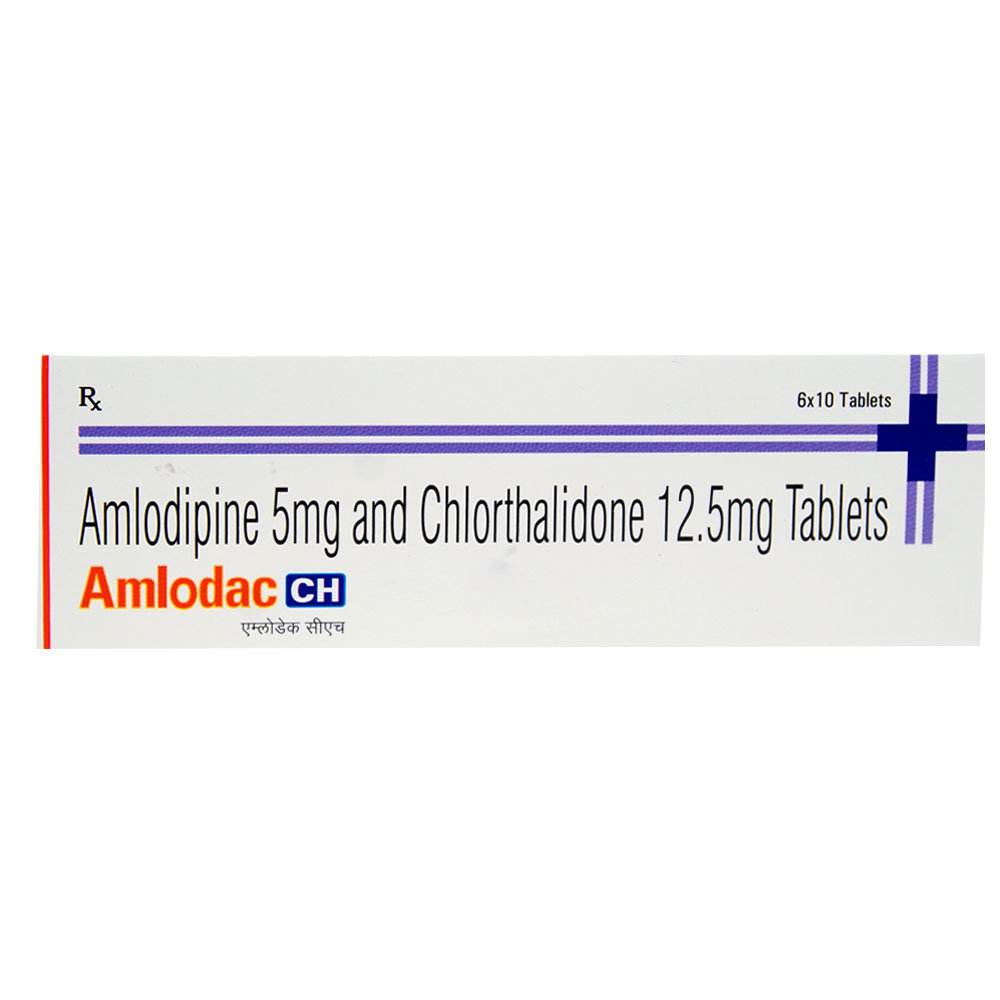Amlodipine+chlorthalidone
About Amlodipine+chlorthalidone
Amlodipine+chlorthalidone belongs to a group of medicines known as anti-hypertensives, primarily used to treat high blood pressure, heart failure, and edema (a buildup of fluid in the body). Hypertension or high blood pressure is a lifelong or chronic condition in which the force exerted by the blood against the blood vessel (arteries wall) increases. The higher this blood pressure, the harder the heart has to pump. edema may occur in case of high blood pressure where fluids of the body get trapped in the tissues of the hands, arms, feet, ankles and legs, leading to its swelling.
Amlodipine+chlorthalidone contains Chlorothiazide and Amlodipine. Chlorothiazide is a diuretic that increases the amount of urine passed out from the kidneys. It effectively reduces excess fluid levels in the body and treats Edema (swelling) associated with heart, liver, kidney or lung disease. Amlodipine is a calcium channel blocker and works by relaxing and widening the blood vessels. This, in turn, reduces the heart's workload and makes the heart more efficient at pumping blood throughout the body. So, it helps to lower high blood pressure, reducing the chances of heart attack or stroke.
Take Amlodipine+chlorthalidone as prescribed by your doctor. You are advised to take Amlodipine+chlorthalidone for as long as your doctor has prescribed it for you, depending on your medical conditions. You may experience glucose intolerance (low or high level of glucose), ankle swelling, sleepiness, headache, (sense of heat in the face, ears, neck, and trunk), flushing, tiredness, nausea, decreased potassium level in the blood, Increased blood uric acid and altered blood lipid level. Most of these side effects of Amlodipine+chlorthalidone do not require medical attention and gradually resolve over time. However, if the side effects are persistent, reach out to your doctor.
Try not to stop taking this medicine of your own. Tell your doctor about this, as it may cause a rise in blood pressure and can increase the risk of heart complications like stroke and heart disease. Inform your doctor if you are suffering from any kidney or liver, or heart disease or are diabetic. Taking Amlodipine+chlorthalidone during pregnancy may cause side effects like jaundice (yellowing of the skin or eyes), unexplained bleeding, low blood sugar or an electrolyte imbalance in the newborn baby. Do not use Amlodipine+chlorthalidone if you cannot urinate, have low blood pressure (hypotension), or cardiogenic shock (sudden stopping blood flow to the heart). Reducing the amount of table salt (sodium chloride) in your food often relieves the body's swelling.
Uses of Amlodipine+chlorthalidone
Medicinal Benefits
Amlodipine+chlorthalidone is a combination drug used to treat hypertension. When you take Amlodipine+chlorthalidone, your body's blood vessels will be relaxed, and it will help lower the raised blood pressure. It also widens the blood vessels (lining of arteries wall) and improves blood flow. It helps in losing out excess fluids from the body by increasing the production of urine. This reduces the heart's workload and makes the heart more efficient at pumping blood throughout the body. Thus, it helps to lower high blood pressure, reducing the chances of heart attack or stroke. Amlodipine+chlorthalidone also helps decrease fluid buildup, which reduces inflammation or swelling. In addition, this relieves Edema and helps you carry out your daily activities more efficiently.
Directions for Use
Storage
Side Effects of Amlodipine+chlorthalidone
- Glucose intolerance (low or high level of glucose)
- Ankle swelling
- Sleepiness
- Headache (sense of heat in the face, ears, neck, and trunk)
- Flushing
- Tiredness
- Decreased potassium level in the blood
- Increased blood uric acid
- Altered blood lipid level
Drug Warnings
Amlodipine+chlorthalidone should not be given to the people allergic to Amlodipine+chlorthalidone, have low blood pressure (less than 90 mm of Hg), have had a heart attack, kidney disease, liver disease, gout (high uric acid), high cholesterol (hyperlipidemia), pregnant women or planning to get pregnant and breastfeeding women. Besides this, it is contraindicated in people with cardiogenic shock (sudden stopping of blood flow to the heart) and aortic stenosis (heart valve problem). Amlodipine+chlorthalidone can pass into breast milk, but its effect on the baby is unknown. So, it is better to tell your doctor if you take Amlodipine+chlorthalidone and breastfeeding. Tell your doctor if you are on low sodium (table salt) diet. Cases of electrolyte imbalance have been observed (like low levels of sodium, potassium, or magnesium in your blood). So your doctor might advise monitoring blood pressure, kidney function tests and electrolytes.
Drug Interactions
Drug-Drug Interaction: Amlodipine+chlorthalidone may interact with other high blood pressure-lowering pills (metoprolol, ramipril, hydrochlorothiazide, atorvastatin) and can lower your blood pressure leading to severe conditions. Besides this, it also interacts with medicine to treat erectile dysfunction (sildenafil), anti-epilepsy medicines (carbamazepine, phenobarbital), immune-suppressing drugs (cyclosporine), painkillers (ibuprofen, aspirin), anti-biotics(rifampicin), antipsychotics(ziprasidone, lithium).
Drug-Food Interaction: You are recommended not to consume alcohol with Amlodipine+chlorthalidone to avoid unpleasant side effects.
Drug-Disease Interaction: Amlodipine+chlorthalidone should not be given to people with cardiogenic shock (when the heart fails to pump required blood to the body), heart valve problem (stenosis), low blood pressure (hypotension), coronary heart disease, liver disease or heart failure, low serum potassium (hypokalemia), patients with nil urine output (anuria).
Drug-Drug Interactions Checker List:
Safety Advice

Alcohol
cautionYou are recommended not to consume alcohol along with Amlodipine+chlorthalidone to avoid unpleasant side effects.

Pregnancy
cautionAmlodipine+chlorthalidone is not recommended during pregnancy unless your doctor considers it essential. Your doctor will weigh the benefits and any potential risks before prescribing it to you.

Breast Feeding
cautionAmlodipine+chlorthalidone should not be used when breastfeeding unless necessary. Your doctor will weigh the benefits and any potential risks before prescribing. Please consult your doctor.

Driving
unsafeIt is not recommended to drive after taking Amlodipine+chlorthalidone as it may occasionally cause drowsiness.

Liver
cautionAmlodipine+chlorthalidone to be taken with caution, especially if you have a history of liver diseases/conditions. Your doctor may adjust the dose if required based on your condition.

Kidney
cautionAmlodipine+chlorthalidone to be taken with caution, especially if you have a history of kidney diseases/conditions. Your doctor may adjust your dose depending on your current kidney conditions.

Children
cautionAmlodipine+chlorthalidone to be taken with caution, especially if you are children below 12. Your doctor will decide the dose based on the age and condition of your child.
Habit Forming
Diet & Lifestyle Advise
- Keep your weight under control with a BMI of 19.5-24.9.
- Do regular physical activity or exercise for at least 150 minutes per week or about 30 minutes most days of the week. Doing this can help lower your raised blood pressure by about 5 mm Hg.
- Opt for a diet rich in whole grains, fruits, veggies and low-fat dairy products.
- Limit intake of sodium chloride (table salt) in your daily diet to 2300 mg per day or less than 1500 mg is ideal for most adults.
- If you are taking alcohol, then only one serving for women and two servings for men is advisable.
- Quitting smoking is the best strategy to lower the risk of heart disease.
- Avoid chronic stress, as it can raise your blood pressure.
- Monitor your blood pressure daily and if there is too much fluctuation, immediately contact your doctor.
- Try to include heart-healthy omega-3 fatty acids-containing food drinks in your daily diet. You can also use low-fat cooking oil like olive oil, soybean oil, canola oil, and coconut oil can help lower your elevated blood pressure.
Special Advise
- If you have taken high doses, drink more water and Consult your doctor immediately.
- It is advised to restrict salt intake in the diet.
- Monitor your blood pressure, kidney function test and electrolytes while using Amlodipine+chlorthalidone as cases of electrolyte imbalance have been observed (like low levels of sodium, potassium, or magnesium in your blood).
Patients Concern
Disease/Condition Glossary
Hypertension: It is a chronic condition when blood pressure is too high. This condition can lead to hardened arteries (blood vessels), decreasing the blood and oxygen flow to the heart. Blood pressure is the measurement of the force that our heart uses to pump blood to all parts of the body. Raised blood pressure can cause chest pain (angina) and heart attack (when blood supply to the heart is blocked). High blood pressure also causes brain damage (stroke) and kidney failure. High blood pressure can be diagnosed with the help of a blood pressure monitor or sphygmomanometer. Systolic pressure is the pressure when the heart pumps blood out. On the other hand, diastolic pressure is the pressure when your heart is at the resting stage between heartbeats. If your blood pressure is 140/90 mm of Hg, it means the systolic pressure is 140 mm of Hg and, diastolic pressure is 90 mm of Hg. Ideal blood pressure should be between 90/60 mm of Hg and 120/80 mm of Hg.
Edema: A condition of fluid retention in the body known as 'dropsy' or 'hydropsy' is also characterised by swelling of the body's tissues, including the ankles, feet, and legs. It is typically brought on by excessive amounts of salt consumption, prolonged standing or sitting in one place and being overweight. The lymphatic system, which includes the circulatory and immune systems, as well as organs like the tonsils, spleen, and thymus, which maintain fluid balance and fight infections, are the main targets of edema.
FAQs
Amlodipine+chlorthalidone contains Chlorothiazide and Amlodipine. Chlorothiazide works by increasing the amount of urine passed out from the kidneys. It effectively reduces excess fluid levels in the body and treats Edema (swelling) associated with heart, liver, kidney or lung disease. Amlodipine works by relaxing and widening the blood vessels. This, in turn, reduces the heart's workload and makes the heart more efficient at pumping blood throughout the body.
Also known as 'dropsy' or 'hydropsy,' it is a condition of fluid retention in the body characterized by swelling of the body's tissue, including ankles, feet and legs. It is usually caused by standing or sitting in the same position for too long, eating too much salty food and being overweight. Edema mainly affects the lymphatic system (including the circulatory and immune systems) and organs like the tonsils, spleen and thymus, maintaining fluid balance and fighting infections. If it does not subside, please consult your doctor immediately.
It's unlikely that Amlodipine+chlorthalidone affects fertility in men or women. However, some water pills like hydrochlorothiazide may lead to erectile dysfunction. There's not enough evidence to say for certain. For the best advice, consult your doctor.
No, you are advised to inform your doctor and monitor your blood pressure for at least two weeks before stopping the medicine. Depending upon your current blood pressure readings, there is a possibility your doctor may lower your medicine dosage and not recommend discontinuing it.
No, you are advised to inform your doctor and monitor your blood pressure for at least two weeks before stopping the medicine. Depending upon your current blood pressure readings, there is a possibility your doctor may lower your medicine dosage and not recommend discontinuing it.
Amlodipine+chlorthalidone can be safely taken as long as your doctor has prescribed it to you. Conditions such as high blood pressure are life-long conditions, and one should not abruptly discontinue it without discussing it with a doctor.






